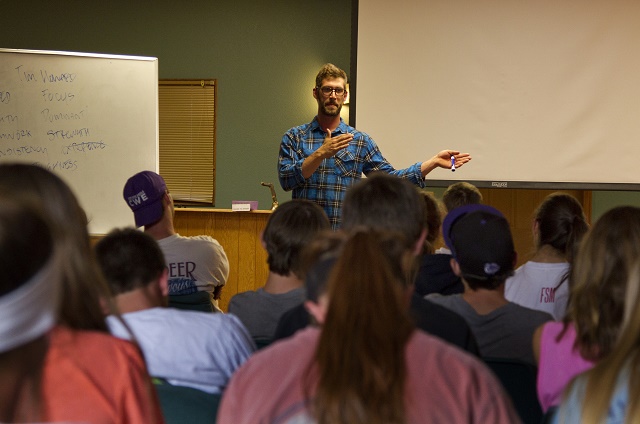WARNING: College can be hazardous to your spiritual health. When you get to college, you’re leaving behind your network of support and heading to a world with different perspectives, responsibilities, and expectations. Even if you’re going to a “Christian” college, there’s no guarantee you won’t face challenges to your faith. So how do you stay Christian in college? How do you stay open about your faith in the face of potential ridicule?
One day a student approached me after class. She seemed to be close to tears. “In lecture today, you mentioned that you’re a Christian,” she said. “I’ve never heard that from any other professor, and every day I spend at this university, I feel my faith is under attack.”
I knew how she felt. Modern institutions of higher learning have changed dramatically in the last half-century, and from the moment students set foot on the contemporary campus, their Christian convictions and discipline are assaulted. “Faith is just a crutch,” they hear from friends and teachers. “The Bible is just mythology.” “Christianity is judgmental and intolerant.” “Morality is different everywhere and everyone must find his own truth.” No wonder so many lose their faith!
But here’s the good news: Higher education doesn’t have to be a wasteland. With a little help, Christian students can find college a means of God’s blessing instead of a spiritual snare. There are many myths and misconceptions that students will encounter head on. These ideas have a strong presence on most campuses and cover a variety of topics including love, sex, politics, and the search for knowledge. It is this last topic that we will identify five specific myths that will arise on campus.
5 Myths About the Search for Knowledge
False ideas about the relationship between faith and reason undermine the confidence of many college Christians and encourage other students to be hostile to Christianity. It’s time to set the record straight by explaining how faith and reason are really related.
- Thinking you the know the truth is arrogant and intolerant. Arrogance doesn’t come from having convictions about the truth; it comes from having the wrong convictions about how to treat people who don’t share it with you. Humility doesn’t come from not having any convictions, it comes from having the right convictions about the importance of gentleness and respect.
- Faith hinders the search for truth because it gets in the way of reasoning. To say faith gets in the way of reasoning stands facts on their head, for reasoning itself depends on faith.
 Reasoning depends on trust (another word for faith). How do you know the moon is made of rock instead of cheese? You say people have been there and found out. But did you go along to make sure? Of course not, you trust that they were telling the truth. The plain fact is that unless you have some faith, you can’t reason even an inch. So whether to have faith isn’t an issue. You will have faith in something- if not in God, then in something else. The only real question is which kind of faith to have. Reasoning depends on faith, falsely placed faith will keep you from truth, but rightly placed faith will help you find it.
Reasoning depends on trust (another word for faith). How do you know the moon is made of rock instead of cheese? You say people have been there and found out. But did you go along to make sure? Of course not, you trust that they were telling the truth. The plain fact is that unless you have some faith, you can’t reason even an inch. So whether to have faith isn’t an issue. You will have faith in something- if not in God, then in something else. The only real question is which kind of faith to have. Reasoning depends on faith, falsely placed faith will keep you from truth, but rightly placed faith will help you find it. - There isn’t any truth. It doesn’t take much to demolish this myth. When a classmate says, “There isn’t any truth,” just ask him, “Oh, is that true?” Do you see how that works? If he answers, “sure it’s true, I said it, didn’t I?” you say, “Then you admit that something is true.” But if he answers, “Of course it’s not true because nothing is,” then you say, “well if it’s not true that there isn’t truth, then it is true that there is truth.” It doesn’t make sense that there is no truth because it wouldn’t even be true that there isn’t.
- Truth is whatever you sincerely believe. Can you make something true just by thinking it? If you sincerely believe you are a diet coke, are you really one? Nobody outside the mental hospital falls for the “truth-is-whatever-you-sincerely-believe” gimmick when the subject is a diet coke, yet many students fall for it when the subject turns to the big, important topic of God. This argument is fraught with inconsistency. For what is true when two people sincerely believe opposing ideas of truth? Sincerity doesn’t make anything true.
- Truth is whatever people accept- or whatever you can get them to swallow. This myth wears many disguises. Many will scoff at Christian beliefs as old-fashioned or obsolete. What they’re really saying is “people around here don’t accept them anymore, and that’s all it takes for them to be false.” The idea that there aren’t any standards of truth but the ones your community agrees to is “communitarianism.” It is also referred to as “consensus theory of truth” or “social construction of reality.” The idea that truth is whatever you can get people to swallow has a superficial appeal because there really are some cases where agreement makes a thing true. The most obvious example is a code of laws that a society adopts. People drive on the right side of the road in one country because everyone agrees to it. However, this can change for each community- a different nation decides that everyone will drive on the left side of the road. The Vikings agreed that the earth was flat. The Nazis agreed that Jews should be killed. Did that make either of them right? Popular agreement doesn’t make a statement true, people have been swallowing nonsense since the world began.
On campus, you’ll encounter many myths about the search for truth. Labels like skeptic, relativist, and post-modernist go in and out of fashion, and other labels take their place. Don’t worry about what people call themselves, listen to what they say. Ask them to cut out the jargon and tell you in plain words what they think. For believers, there’s nothing to be afraid of because the armor of God is stronger than the weapons of the Enemy. But you must actually strap the armor on! Empower yourself with God’s word and know that He does not change regardless of what school you are attending.
Dive deeper with J. Budziszewski in How to Stay Christian in College. It is a great resource for recent high school graduates, parents of college students, and those already in college. Profesor Budziszewski will guide readers through the maze of campus realities. He discusses the foundations of the Christian faith and directly addresses different worldviews and myths that students may encounter at college.


